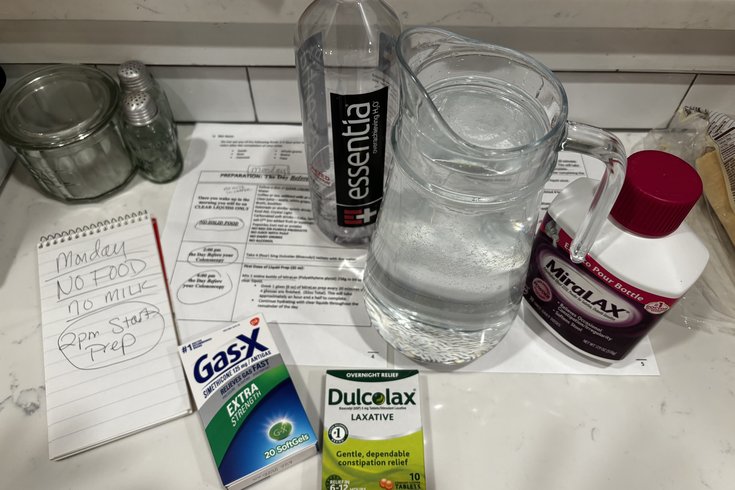
February 09, 2024
 Courtenay Harris Bond/PhillyVoice
Courtenay Harris Bond/PhillyVoice
Preparing for a colonoscopy involves brief dietary changes, a clear-liquid diet the day before, and consuming a laxative drink. Above, the general ingredients for a colonoscopy prep.
Kevin Cunningham's grandfather died at age 43 from colorectal cancer. Cunningham's mother was just 3.
Because of this family history, Cunningham, now 40, had his first colonoscopy at 30. His gastroenterologist found polyps that tested benign. Cunningham had follow-up colonoscopies at 33 and at 38, both of which were clear.
"I know not everybody wants to talk about those negative things in your family history, but you want to be around for your kids," said Cunningham, who now lives in Jim Thorpe with his wife and three children.
Though the overall rate of colorectal cancer has been declining, it has been rising among people 55 and younger by 1% to 2% each year since the mid-1990s, according to the American Cancer Society's annual report, published last month. Colorectal cancer is now the leading cause of cancer death among men under 50 and second among women in the same age range.
That is why the medical community has dropped the recommended age for starting colorectal cancer screening from 50 to 45 among most adults. People with a genetic predisposition to colorectal cancer, or a strong family history of it, may require even earlier screenings, as was the case for Cunningham.
Screenings range from a stool test every one to three years to a more involved procedure every five years during which a doctor inserts a thin, short tube with a light inside the rectum and the lower third of the colon. Or a doctor may recommend a colonoscopy, requiring inspection of the entire colon and rectum for polyps and signs of cancer.
Scientists do not know why colon cancer is on the rise among young adults, said Dr. Shivan Mehta, an associate professor of gastroenterology at Penn Medicine. "It could be something environmental," he said. "It could be something related to diet."
However, if detected at an early stage before it has spread, the five-year relative survival rate for colorectal cancer is about 90%, according to the American Cancer Society. Treatment may involve surgery, chemotherapy or radiation – or a combination of them.
"If you have abdominal pain, unintentional weight loss, rectal bleeding, changes in your bowel habits – it's important to mention these things to your doctor so they can evaluate it better," said Mehta, also the associate chief innovation officer at Penn Medicine.
Colorectal cancer may start with polyps, growths on the inner lining of the rectum or colon. During a colonoscopy, a gastroenterologist can remove polyps and any cancer, and send them to a lab for evaluation.
Mehta and his team have been exploring ways to make colonoscopy preparation easier to understand and more accessible to all populations through more user-friendly instructions, text message reminders and prompts, and other measures.
Overall, about 70% of people who are eligible for colorectal cancer screenings get them, and screening rates for people 45-49 are rising.
"We're moving in the right direction, but we think we could do better," Mehta said.
New screening methods, such as blood tests, may be on the horizon, and the more options available for early detection, the better, Mehta said. But colonoscopies may remain the most accurate way to screen for colorectal cancer, he added.
Here's what a colonoscopy preparation generally involves:
• Eat low-fiber foods and stop taking any fiber supplements or anti-diarrheal medication at least three days before the procedure.
• Maintain a clear-liquid diet one day before the colonoscopy.
• Drink half of a prescription laxative drink the evening before, and finish the rest in the morning, in order to clear out your entire colon for the procedure.
• Because the procedure requires anesthesia, someone must drive you home. Doctors' offices usually do not allow patients to use ride-booking services. Your doctor will tell you how to schedule your colonoscopy and give you detailed instructions about how to prepare for the procedure.